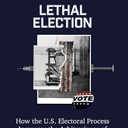
The New Mexico Supreme Court has cleared the state’s death row, vacating the death sentences imposed on the state’s final two death-row prisoners, and directing that they be resentenced to life in prison. The rulings, issued by a divided court on June 28, 2019 in the cases of Timothy Allen (pictured, left) and Robert Fry (pictured, right), came almost ten years to the day after New Mexico’s death-penalty abolition, signed into law by Governor Bill Richardson, took effect. However, the 2009 legislation applied only to future cases, leaving intact the sentences imposed on Allen and Fry.
By a 3 – 2 vote, a majority of the sitting justices found that the death sentences violated the proportionality requirements of New Mexico’s death-penalty statute, which directs that “the death penalty shall not be imposed if … the sentence of death is excessive or disproportionate to the penalty imposed in similar cases.” Writing for a majority that included retired Justices Edward L. Chávez and Charles W. Daniels, Justice Barbara J. Vigil wrote: “In comparing Petitioners’ cases to other equally horrendous cases in which defendants were not sentenced to death, we find no meaningful distinction which justifies imposing the death sentence upon Fry and Allen. The absence of such a distinction renders the ultimate penalty of death contrary to the people’s mandate that the sentence be proportionate to the penalties imposed in similar cases.”
In reaching its decision, the court majority said that the legislature’s repeal of the death penalty had changed the legal landscape for addressing the validity of the capital sanctions imposed upon Fry and Allen. “While there is a legitimate interest in the finality of criminal judgments,” the court wrote, “the repeal of the death penalty presents a profound change in the legal and factual framework surrounding Petitioners’ death sentences such that the interests of justice require that we ensure that those sentences are not disproportionate to the penalty imposed in similar cases.” In examining those cases, the court concluded that, “although the death penalty was an option in many cases predicated on similar facts, the death sentence was rarely imposed. Our review of these cases does not reveal a justification for Petitioners’ death sentences and instead demonstrates that Fry and Allen were singled out for the death penalty,” the decision states. In a concurring opinion, Justice Daniels wrote, “A killer’s crimes reflect who he is. What we do to the killer reflects who we are. Can we really look anyone in the eye and say that executing these two defendants would be proportionate when compared to non-deadly punishment our state has overwhelmingly meted out in virtually all equally serious first-degree murder cases, and specifically in similar cases, since enactment of the Capital Felony Sentencing Act in 1979? I, for one, cannot honestly do so.”
Chief Justice Judith K. Nakamura and retired Justice Petra Jiminez Maes dissented, calling the majority’s decision an “intru[sion] upon the capital-sentencing jury’s rightful, constitutional authority to extend mercy or impose death” that was inconsistent with the legislature’s specific intent to leave the death sentences in place for Fry and Allen. The three retired justices were on the bench when Allen and Fry filed their appeals in the state supreme court and when the cases were argued before the court. They retired last year but remained on the case by special designation.
New Mexico was the first of three states in which legislatures prospectively abolished the death penalty, leaving prisoners on death row. After Connecticut abolished its death penalty in 2012, the Connecticut Supreme Court ruled that executing the remaining 11 prisoners on the state’s death row would violate the state constitution. The prisoners have since been resentenced to life without parole. One prisoner remains on death row in New Hampshire following the state’s repeal of capital punishment on May 30, 2019. Prior to repeal, New Mexico had imposed 15 death sentences in the modern era. The one person the state had executed, Terry Clark, had waved his appeals.
Elise Kaplan and Dan Boyd, No one left on NM’s death row, Albuquerque Journal, June 28, 2019; Marian Camacho, NM Supreme Court vacates death sentences for final two on death row, KOB-TV, June 28, 2019.
Read the June 28, 2019 opinion of the New Mexico Supreme Court in Fry v. Lopez and Allen v. Lemaster.



